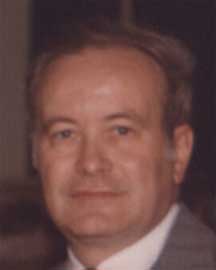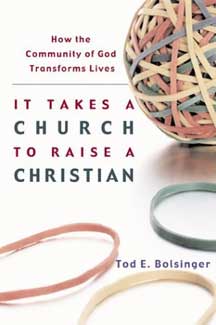Blog Archive for 4/11/04 - 5/1/04
| Blog Series During the Time of This Archive | (not in archive; click on titles to access) |
| Easter from the Other Side of the Pulpit | April 12-16, 2004 |
| Why Did Jesus Have to Die? | April 19-(ongoing) |
A Sad Day
Posted at 9:30 p.m. on Saturday, May 1, 2004
My blogging intentions for today have been scuttled by sad events among my family and friends. So please forgive another day’s delay before I get back to the series, “Why did Jesus have to die?”
| A month ago my family got a new puppy -- a beautiful, playful, seven-week old Golden Retriever. My children came up with the name “Mandy,” which is a version of a name that means “Beloved.” Mandy was, indeed, quickly loved by my wife, my children, and me. She did bothersome things that puppies do, like piddle on the carpet and nibble on our legs, but she was a smart dog and was quickly learning the rules of dog-human society. At eleven weeks she had mastered “sit,” “flop” (lie down), and even “fetch.” We were working hard on “off” and “gentle.” She could sleep through the night without making a fuss. Mandy loved to play and was extremely affectionate. In fact, during many April blogging sessions she lay under my chair, happy to be close to me. And I felt pretty darn happy with her company. |  |
Yesterday, for no apparent reason, Mandy began to choke on some food. Immediately things became much more serious. I’ll spare you the details. Before we knew it we were rushing her off to the vet, and then to the animal hospital. Early this morning we received the call that Mandy was about to die. So we awakened our children and made a difficult trek to say our “goodbyes” to Mandy. As you can imagine, we’ve had a sad day as a family.
Frankly, I am shocked by how sad I feel. After all, I know that Mandy was just a dog, not a human being. And I only knew her for a month. But, still, I feel like a part of my heart has been torn out.
But perhaps the saddest part of all has been going through this with my children. This has been, undoubtedly, the hardest day of their lives. (My kids are 9 and 11 years old.) They loved Mandy in the way that only children can, unreservedly. So now they are grieving as only children can, unreservedly. Plus, they’re wondering why God let this happen. This is a question for which there isn’t a great answer. I can satisfy my intellect with an adequate theological answer, but I can’t thereby soothe the aching hearts of my children. All I can do is hug them a hundred times.
Ironically, when we got Mandy, I told my wife that she would help my children learn about death. I envisioned an event ten or twelve years in the future, not four weeks after we brought her home. My children are in fact learning lots about death and loss and grief, but not at all in the way I had anticipated or wanted, that’s for sure.
As an adult, I can put our sadness in perspective, and I have shared this with my children. As much as we miss Mandy, our pain is nothing like that of families of our soldiers who died in Iraq this week. And our struggle is nothing like that of a dear family friend, Julie, who found out yesterday that her serious cancer has returned. Julie is a loving mom with a devoted husband and two incredible young children. She’s already in chemotherapy, an aggressive type that is horrendous to go through but may very well save her life. If you are a person who prays, I’d ask you to stop reading for a moment and pray for Julie and her family.
Yesterday I received an e-mail from Julie, an update on her condition and challenges. In the midst of laying out some really scary facts, Julie included these lines, which I’ll share with you in closing.
“God is good all the time. I know He is sovereign over this big picture and that He will gradually reveal it to us.”
Thanks, Julie, for your example of faith. I’ll be praying for you and your family – all the time!
A Tribute to My Father
Posted at 10:00 p.m. on Friday, April 30, 2004
Today is my father’s birthday. If he were alive, he’d be 72 years old today. But, I’m sad to say, my dad died of liver cancer almost 18 years ago. I hope they get to celebrate birthdays in heaven!
This tribute to my father could go on and on. But I’ve chosen to focus on one quality I deeply admire in him: his honesty. I can truly say that I have no memory of my dad ever telling a lie, even a little white one. Sometimes his honesty was almost embarrassing, because my dad would tell the truth when others lacked the courage to do so.
| Consistent with my father’s own commitment to truthfulness was his inability to accept anything less from me. I remember many times when he demanded that I tell the real truth, no matter how tough it was for me to do so. When I got my first speeding ticket as a teenage driver, I tried to blame circumstances, the slope of the hill I was driving down, and anything other than myself. My dad would have none of it. “Admit you were wrong,” he said emphatically. And then, when I did, he offered grace. I learned from my dad that if I told the truth, I wouldn’t be clobbered by the results. |  |
It’s probably no accident that my latest book, Dare to be True, is a call to truthfulness. You could see this book simply as an outgrowth of the way I was raised. I dedicated this book to my mother, who also told me to honest and practiced what she preached. But I could just as well have dedicated this book to my father. I only wish my dad were around to see Dare to Be True and to realize the wider scope of his influence upon my life.
Often these days I wish my dad were still here on earth. I thought this often during March Madness. My father loved college basketball. In fact, while he was in college he was the manager of the University of Connecticut men’s basketball team. How I wish my dad had been here for this year’s NCAA championships! (If you don’t follow college basketball, let me add that both the men’s and the women’s teams from the University of Connecticut won national championships this year – an unprecedented accomplishment from my dad’s alma mater.)
Also, as I’m blogging away, I sometimes think how much my dad would have loved the Internet. He got into computers in the mid-1950’s, when a computer far less powerful than my laptop filled an entire room. Professionally, my father was a computer programmer, and then a computer systems analyst. In the early 1970’s we had a computer terminal in our home with a modem connection to a mainframe miles away – almost unheard of in that day. If my dad were alive today, I know he’d be thrilled about the power of the microchip. Who knows? My own dad might have his own blog!
I miss my father when I think about NCAA basketball and the thrills of the Internet, but mostly I miss his company. I can still remember what his voice sounded like, but just barely. I wish I could talk with my dad about the challenges I face in midlife. I wish he could know my children and that they could know their grandfather. I wish I could ask my dad the hundreds of questions I’ve thought of since he died. I wish I could tell him just how much his honesty means to me now. And, above all, I wish I could hug him and tell him I love him.
An Interview with Tod Bolsinger,
author of It Takes a Church to Raise a Christian
Posted at 9:40 p.m. on Saturday, April 17, 2004
Welcome to the first interview I’ve put up on my website. My victim is Dr. Tod Bolsinger, Senior Pastor of San Clemente Presbyterian Church and author of an outstanding new book, It Takes a Church to Raise a Christian: How the Community of God Transforms Lives (Baker, 2004).
MDR: So, Tod, your first book is out. How do you feel? TB: Pretty gratifying actually. I have been working on this book since the first George Bush was president of the United States so its great to have people actually read it. It started as a Ph.D. dissertation and then I had a chance to rewrite it, drawing from my experiences being a pastor of growing church. Now, I feel as if I have something that can be helpful to those who care deeply about seeing their churches make a difference for Christ in the world. If Bill Hybels is correct that the “local church is the hope of the world” then we need to take much more seriously the local church. |
 |
MDR: As a pastor of a local church, I can say “Amen” to that. Of course, since I’m a Presbyterian and not a Baptist, I don’t say “Amen” to things. Anyway, let’s cut to the chase? What do the rubber bands on the cover of your book mean?
TB: Ah…they have a dual meaning. They represent the intertwined reality of Christian community that reflects the way in which the persons of the Trinity are all unique but interrelated. It was my publisher’s idea and I must say that I think it’s a pretty cool image for who God is and what we are supposed to be as the Christian church: all distinct persons wrapped together as one.
MDR: Hmmm. I like that. And, yes, I think it’s a cool cover. Tod, I’ve got discerning readers and they have busy lives. Can you summarize the main point of your book in fifty words (or less)?
TB: I can do it in a lot less than that: “As God is, the church should be. The more that the church is like God, the more Christians will become like Christ.”
MDR: Whoa! I don’t know if I’ve ever heard an author summarize a book in only 22 words. That must be some kind of record.
TB: In a nutshell, Mark, this book is about the way that the church is (whether we want to fully believe it or not). We’re the embodiment of Christ on earth. And the more that we together reflect the character of God through our Christian Community, the more we are transformed into the likeness of Jesus Christ. The great news of this biblical and theological truth is that the very people we are seeking to attract to Jesus are actually looking for authentic, godly communities (whether they realize it or not.)
MDR: So your book is not only about growing Christians, but also about drawing people to Jesus Christ. If the church is the church, as God has designed it, then we won’t have to choose between discipleship and evangelism, between growing individual believers and church growth. Well, let me ask you then, for whom have you written this book, primarily? Who is your “target” audience?
TB: This book is primarily for Christian lay leaders to read and discuss with their pastors. Only as both lay leaders and pastors start to read, pray and think together about what the church was meant by God to be, can they help their particular churches begin to, in fact, be it! This book offers them theological insight, strategy and practical dynamics for helping churches become the kinds of places where lives are actually being changed.
MDR: Tod, I’d say “Amen” once again except for, you know, my Presbyterian hang-ups. But I do love what you’re saying about writing for both pastors and lay leaders. Too often books like yours are read only by pastors, who then get all kinds of new ideas about how to change their churches. But their lay leaders haven’t been a part of the pastor’s process, so they’re nervous if not actually hostile to the pastor’s vision. Besides pastors and lay leaders, any other intended audience for your book?
TB: I also wrote the book with eye toward seekers out there who have been disillusioned by churches that are frankly no different than the Kiwanis club (with better music, perhaps!) I hope that it will stimulate both seekers and leaders to work together to transform the church and in so doing, transform their lives.
MDR: As you know, there are tons of books out there on the church. What makes yours distinctive?
TB: There are indeed a lot of books on church right now, but most of them are more about giving specific techniques than about thoughtful and biblical reflection on what God intends the church to be and what we can do about it. Regardless of a church’s size, style, or denomination, this book offers lay leaders and pastors a way to think passionately and act strategically so that their churches are life-transforming reflections of Jesus Christ.
MDR: Sounds great to me, Tod. I’d go out right now and buy your book, except that I already have two copies. But I will recommend to my blog faithful that they purchase your book, maybe even one for themselves and one for their pastor. Thanks, Tod, for being my the subject of my first website interview.
Christ is Risen! He is Risen, indeed!
Posted at 9:30 p.m. on Saturday, April 10, 2004
| But on the first day of the week, at early dawn, they came to the tomb, taking the spices that they had prepared. They found the stone rolled away from the tomb, but when they went in, they did not find the body. While they were perplexed about this, suddenly two men in dazzling clothes stood beside them. The women were terrified and bowed their faces to the ground, but the men said to them, “Why do you look for the living among the dead? He is not here, but has risen. Remember how he told you, while he was still in Galilee, that the Son of Man |  |
Stained glass window of the Resurrection, from the Duomo in Florence, Italy. |
 |
must be handed over to sinners, and be crucified, and on the third day rise again.” Then they remembered his words, and returning from the tomb, they told all this to the eleven and to all the rest. Now it was Mary Magdalene, Joanna, Mary the mother of James, and the other women with them who told this to the apostles. But these words seemed to them an idle tale, and they did not believe them. But Peter got up and ran to the tomb; stooping and looking in, he saw the linen cloths by themselves; then he went home, amazed at what had happened. (Luke 24:1-12) |
"Easter Morning" by the contemporary Christian artist, James Janknegt. For more information, see his website. |